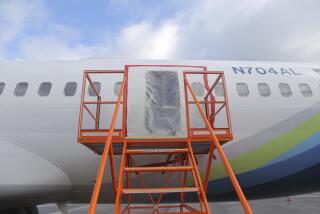The Security Legacy of Flight 800
- Share via
When TWA Flight 800 plunged into the Atlantic a year ago, killing all 230 persons on board, the fact that the plane exploded in midair without any prior indication of trouble suggested a terrorist bomb or perhaps even a missile.
Although neither cause has been ruled out, the absence of any positive lead or physical evidence of sabotage points toward mechanical failure. The irony is that an event in which terrorists may have played no role will result in the most significant increase in aviation security since the adoption of passenger screening nearly a quarter of a century ago.
If terrorists didn’t bring down Flight 800, why improve security? Because the terrorist threat to commercial aviation is real. Terrorists have attempted to plant bombs on airliners on more than 70 occasions that we know about, and have caused at least 15 crashes.
Within days of the TWA crash, President Clinton created a White House commission, chaired by Vice President Al Gore, to review aviation safety and security. The Gore commission’s recommendations on safety and the vital modernization of the air traffic control system will have far reaching effects in the coming years, but it is the commission’s security recommendations that are producing the most immediate effects. Commission members were mindful that another commission, formed shortly after a terrorist bomb brought down Pan Am Flight 103 over Lockerbie, Scotland, killing 271 persons in 1988, also made airliner security its priority; most of its recommendations were never implemented.
The tragedy at Lockerbie prompted a major effort to improve explosives detection technology. Several systems now exist. None provides the desired level of confidence and efficiency, but a combination of technologies and procedures--a multilayered system--will provide a significant improvement. The Gore commission recommended that existing technology be deployed at airports, which is happening.
The commission also recommended the implementation of passenger bag match, to ensure that terrorists cannot check in a suitcase containing a bomb and then not board the flight. Bag matching is now standard procedure on international flights. By the end of this year, U.S. airlines will have a system in place to match bags on domestic flights as well.
Until procedures are in place to ensure that no carry-on or checked baggage contains explosives, it will remain necessary to select some passengers or their luggage for more detailed inspection--procedures that can trigger civil liberties complaints.
While civil libertarians argue that airline “profiling” should not allow access to personal information about travelers (criminal records, for instance), the automated profiling system that will be in place by early 1998 is based primarily on how much an airline already knows--or doesn’t know--about each boarding passenger--not on some theoretical terrorist profile. In fact, airlines now have access to certain information about each passenger--the source of the reservation, means of payment, whether the passenger is a frequent flier, whether he or she is traveling with family members, etc.
The security measures recommended by the Gore commission will cost billions in the long run. Who will pay? The commission recommended that Congress appropriate funds to deploy the new explosives detection technology, but also recognized that the reality of terrorism precludes the government from assuming the entire security burden; passengers must share the cost. With half a billion passenger boardings a year in the U.S., passengers would pay just a few dollars per flight for the increased cost of security.
The commission’s mandate provides no power beyond persuasion. Many recommendations of previous panels were delayed, diluted and years later remained unenforced. This time, progress is being made. The Clinton administration embraced the recommendations, the airlines endorsed them and Congress has provided its support.
Relatives and friends of victims of Flight 800 and others touched by the tragedy cast flowers on the waves as a memorial to those who lost their lives. Safer and more secure air travel will be their lasting legacy.
More to Read
Sign up for Essential California
The most important California stories and recommendations in your inbox every morning.
You may occasionally receive promotional content from the Los Angeles Times.










